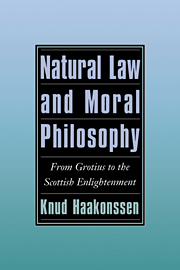Book contents
- Frontmatter
- Contents
- Acknowledgements
- Introduction: The Scottish Enlightenment in the history of ideas
- 1 Natural law in the seventeenth century
- 2 Natural law and moral realism: The civic humanist synthesis in Francis Hutcheson and George Turnbull
- 3 Between superstition and enthusiasm: David Hume's theory of justice, government, and politics
- 4 Adam Smith out of context: His theory of rights in Prussian perspective
- 5 John Millar and the science of a legislator
- 6 Thomas Reid's moral and political philosophy
- 7 Dugald Stewart and the science of a legislator
- 8 The science of a legislator in James Mackintosh's moral philosophy
- 9 James Mill and Scottish moral philosophy
- 10 From natural law to the rights of man: A European perspective on American debates
- Bibliography
- Index
8 - The science of a legislator in James Mackintosh's moral philosophy
Published online by Cambridge University Press: 05 June 2012
- Frontmatter
- Contents
- Acknowledgements
- Introduction: The Scottish Enlightenment in the history of ideas
- 1 Natural law in the seventeenth century
- 2 Natural law and moral realism: The civic humanist synthesis in Francis Hutcheson and George Turnbull
- 3 Between superstition and enthusiasm: David Hume's theory of justice, government, and politics
- 4 Adam Smith out of context: His theory of rights in Prussian perspective
- 5 John Millar and the science of a legislator
- 6 Thomas Reid's moral and political philosophy
- 7 Dugald Stewart and the science of a legislator
- 8 The science of a legislator in James Mackintosh's moral philosophy
- 9 James Mill and Scottish moral philosophy
- 10 From natural law to the rights of man: A European perspective on American debates
- Bibliography
- Index
Summary
Adam Smith and Dugald Stewart
Paying tribute to Dugald Stewart's work during his tenure of the Chair of Moral Philosophy at Edinburgh, Sir James Mackintosh remarked that ‘Without derogation from his writings, it may be said that his disciples were among his best works.’ This parallel is no less accurate for being drawn by one who might well be considered a disciple himself. For just as Stewart produced a substantial philosophical oeuvre which in its main lines derives from that of Thomas Reid, so too he decisively influenced a large number of men who must all, in varying degrees, be characterized as intellectual epigoni. Although Stewart and his circle produced few new and original ideas, they nevertheless deserve some attention, not just because of their influence but also because of an intellectually interesting pattern to their eclecticism, an understanding of which is necessary for an appreciation of the precise nature of their influence.
It is with this pattern of thought – or at least an example of it – that I am concerned here, not with the question of their influence. The latter is fairly well known and documented – how they created the Edinburgh Review; influenced the Whig Party and, beyond that, liberal politics in the nineteenth century; were involved in the making of the Reform Act of 1832; contributed to the spread of educational institutions, ranging from Lancastrian schools to London University.
- Type
- Chapter
- Information
- Natural Law and Moral PhilosophyFrom Grotius to the Scottish Enlightenment, pp. 261 - 293Publisher: Cambridge University PressPrint publication year: 1996



